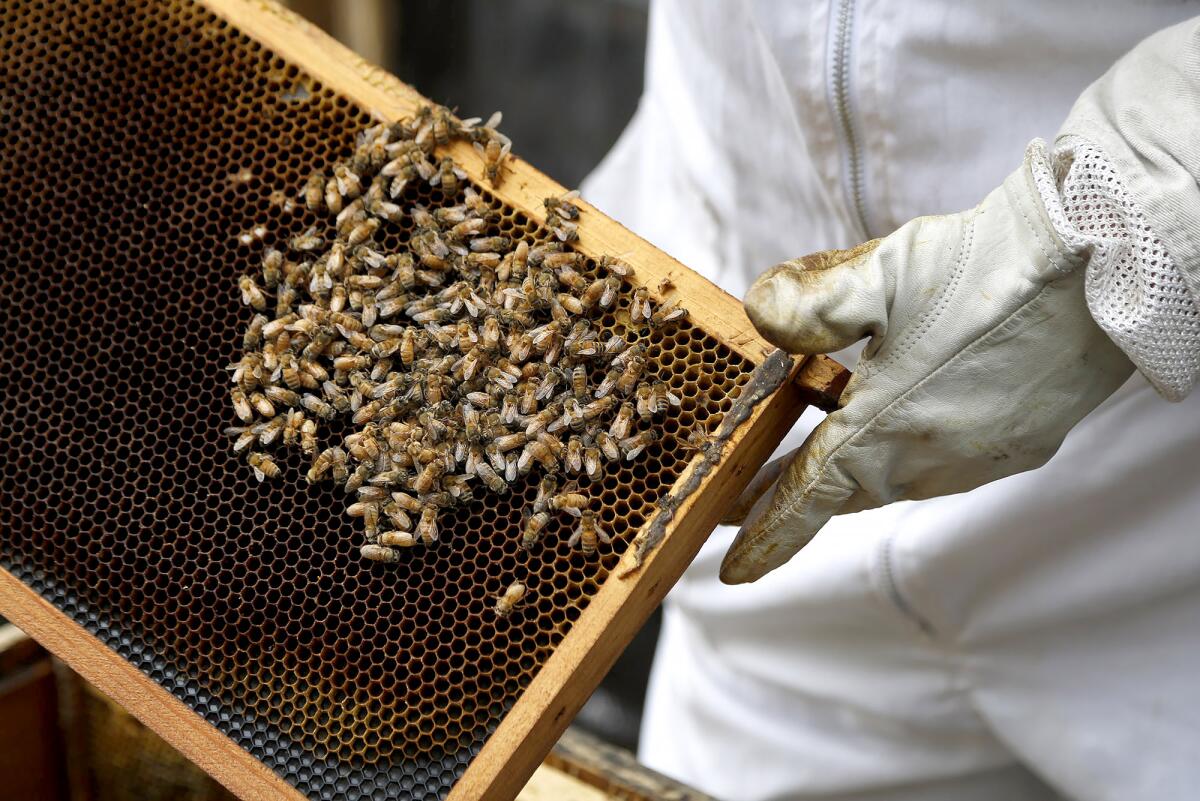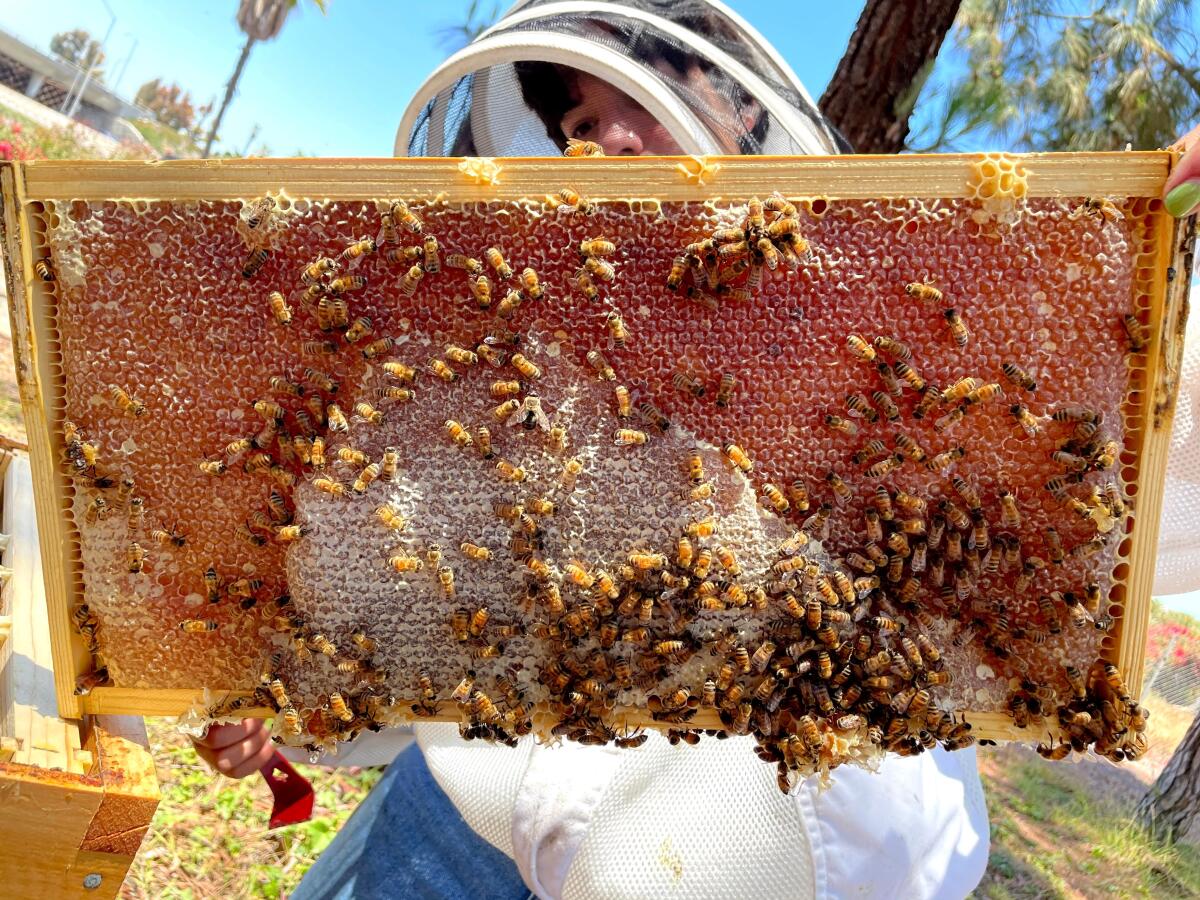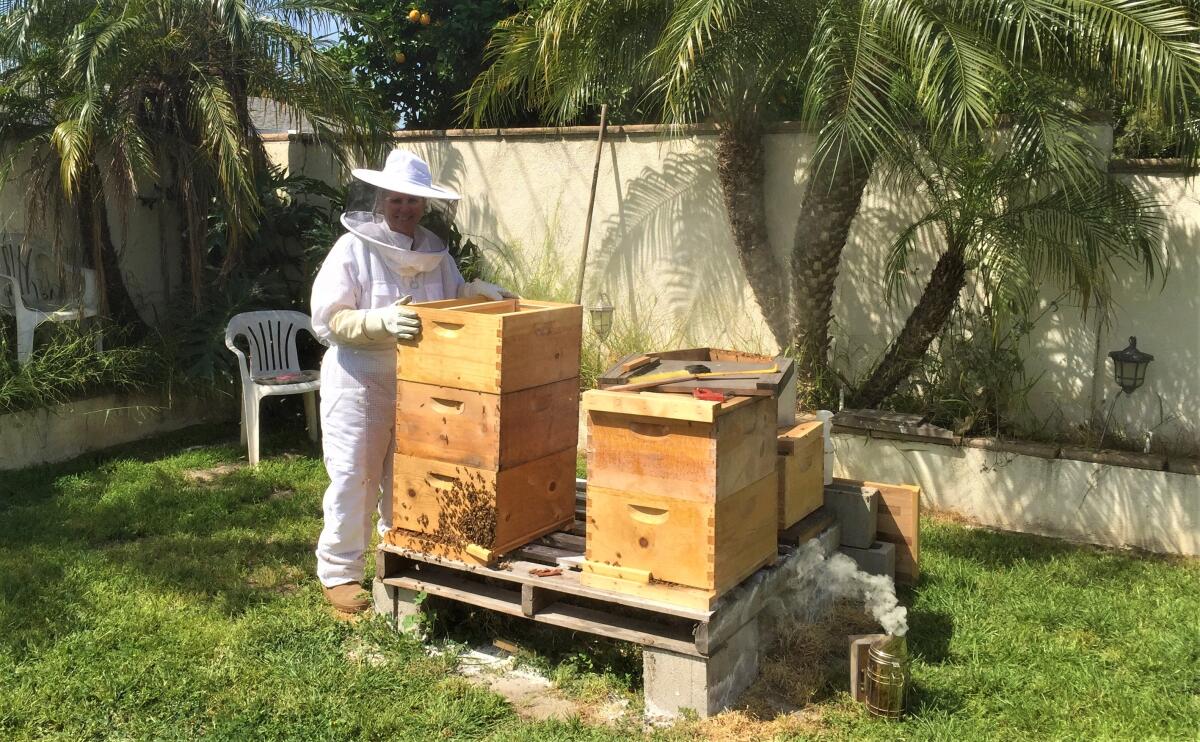Costa Mesa is one wing beat away from legalizing home beekeeping with new law

- Share via
Honeybees buzzing about backyards in Orange County have no idea or care where mankind has elected to draw lines demarcating one city from another, but for humans wishing to keep bees on their properties, such details are vital.
While many cities permit residential beekeeping, including Huntington Beach, Laguna Beach, Fullerton, Santa Ana and Irvine, other cities, like Costa Mesa, have historically made such practices illegal.
But plans for change are on the wing, as the Costa Mesa City Council Tuesday lent initial support to an ordinance that would allow residents to keep and maintain beehives under certain conditions and with a city-issued permit.
Presented by Costa Mesa Police Lt. Stephanie Selinske, who manages the city’s Animal Services Unit, a proposal was put together with input from members of an advisory Animal Services Committee, who presented their own recommendations to the council in May 2023.

Tuesday’s draft law included several restrictions and requirements, such as limiting residential beekeeping to single-family lots larger than 3,000 square feet, requiring would-be apiarists to obtain permission from their adjacent neighbors and mandating them to post warning signs indicating the presence of active hives.
“It would be something to alert any city workers, Amazon drivers or anybody else coming on your property that you’re keeping bees,” Selinske said of the signage. “If you do have an allergy that could be lethal, it would at least be a warning.”
The initial iteration of the ordinance also mandated home beekeepers to register with the county Agricultural Commissioner office and provide proof they had attended a beginners beekeeping course from a reputable institution. They would also be required to pay a $150 fee as part of a permitting process that would include review and home inspections by city staff.
Once obtained, the permit would be good for two years, at which time a beekeeper would have to essentially start the process all over again. Selinske said the law and its tenets were intended to ensure the safety of hive tenders and neighbors alike.
But several in the local beekeeping community, including professional rescuers and hive relocators with decades of experience, took a different view of the draft legislation when addressing the council in public comments.
City laws say it is illegal to keep bees outside of educational or scientific settings, but talk about drafting a law to legalize the practice is taking wing.
They said warning signs would only make bee-friendly homeowners targets of harassment from those who feared the insects and maintained too-restrictive laws would simply inspire the continuance of unpermitted beekeeping.
“It’s going to basically make it impossible to get a permit, and if you were to get a permit it would be so restrictive it would be difficult to continue beekeeping in your city” said Sean Crowley, a commercial beekeeper who’s taught hundreds of students and authored best practices manuals adopted by Fullerton, Irvine and Santa Ana.
“As a long-term beekeeper I would not be able to qualify, because I’ve never taken a beginners beekeeping class, yet I teach them up through an advanced level.”

Several bee enthusiasts urged the council to loosen up the ordinance to make it more user friendly and to encourage people to become educated about bees and the vital role they play as pollinators of flower and food crops, rather than stoking fears of stings.
“This ordinance has been on the books for three years in January, and I’d love to see it pass soon,” said Costa Mesa resident Alberta Mirisciotti, who runs Hey Honey, a licensed bee rescue and relocation business. “We know many people who do go underground, but I won’t do that. I don’t feel I should have to do that in my city.”
Council members sided with speakers, supporting a motion from Councilman Loren Gameros to remove requirements mandating proof of education, neighbor notification and all zoning and size restrictions in Selinske’s draft ordinance.
“I don’t think we should require someone to attend a beekeeping course — I don’t think someone is going to start willy nilly dropping bees in their backyards if they don’t know what they’re doing,” he said. “I don’t think anyone is going to try and drop a beehive in their apartment living room or their balcony. If you have a smaller house, and you have a backyard, you should be able to keep bees.”
Daily Pilot and TimesOC readers share their thoughts about local issues and events. This week, we hear from a Costa Mesa resident who has been told the bees that live on her property have to go.
Councilwoman Arlis Reynolds recommended adding language that would give anyone with currently illegal hives six months to comply and create a similar window for non-compliant people to come up to speed with the new law.
“I want to be sensitive to the scenario that folks may not be aware, immediately upon enacting an ordinance, that we have one,” she said.
While some officials balked slightly at removing nearly all the guardrails from the original version of the law, they agreed the language could be refined when the ordinance returns to the council for a second reading.
Mayor John Stephens said he would not vote for the law unless it provided police and city staff the authority to deny a permit if they deemed it presented a medical threat to any resident.
“I don’t think we should kid ourselves, there are people who are allergic to bees and could die if they get stung,” he said. “If there is a legitimate health issue of a neighboring property, there shouldn’t be bees, period.”
All the latest on Orange County from Orange County.
Get our free TimesOC newsletter.
You may occasionally receive promotional content from the Daily Pilot.









